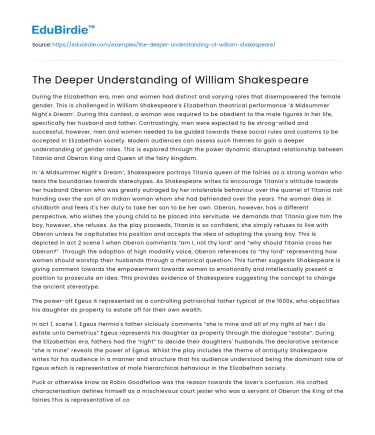During the Elizabethan era, men and women had distinct and varying roles that disempowered the female gender. This is challenged in William Shakespeare’s Elizabethan theatrical performance ‘A Midsummer Night's Dream’. During this context, a woman was required to be obedient to the male figures in her life, specifically her husband and father. Contrastingly, men were expected to be strong-willed and successful, however, men and women needed to be guided towards these social rules and customs to be accepted in Elizabethan society. Modern audiences can assess such themes to gain a deeper understanding of gender roles. This is explored through the power dynamic disrupted relationship between Titania and Oberon King and Queen of the fairy kingdom.
In ‘A Midsummer Night’s Dream’, Shakespeare portrays Titania queen of the fairies as a strong woman who tests the boundaries towards stereotypes. As Shakespeare writes to encourage Titania’s attitude towards her husband Oberon who was greatly outraged by her intolerable behaviour over the quarrel of Titania not handing over the son of an Indian woman whom she had befriended over the years. The woman dies in childbirth and feels it's her duty to take her son to be her own. Oberon, however, has a different perspective, who wishes the young child to be placed into servitude. He demands that Titania give him the boy, however, she refuses. As the play proceeds, Titania is so confident, she simply refuses to live with Oberon unless he capitulates his position and accepts the idea of adopting the young boy. This is depicted in act 2 scene 1 when Oberon comments “am I, not thy lord” and “why should Titania cross her Oberon?”. Through the adoption of high modality voice, Oberon references to “thy lord” representing how women should worship their husbands through a rhetorical question. This further suggests Shakespeare is giving comment towards the empowerment towards women to emotionally and intellectually present a position to prosecute an idea. This provides evidence of Shakespeare suggesting the concept to change the ancient stereotype.
Save your time!
We can take care of your essay
- Proper editing and formatting
- Free revision, title page, and bibliography
- Flexible prices and money-back guarantee
The power-off Egeus it represented as a controlling patriarchal father typical of the 1600s, who objectifies his daughter as property to estate off for their own wealth.
In act 1, scene 1, Egeus Hermia's father viciously comments “she is mine and all of my right of her I do estate unto Demetrius” Egeus represents his daughter as property through the dialogue “estate”. During the Elizabethan era, fathers had the “right” to decide their daughters' husbands.The declarative sentence “she is mine” reveals the power of Egeus. Whilst the play includes the theme of antiquity Shakespeare writes for his audience in a manner and structure that his audience understood being the dominant role of Egeus which is representative of male hierarchical behaviour in the Elizabethan society.
Puck or otherwise know as Robin Goodfellow was the reason towards the lover's confusion. His crafted characterisation defines himself as a mischievous court jester who was a servant of Oberon the King of the fairies.This is representative of court structure in the era. Puck takes delight in the fairy realm in creating havoc.Puck creates chaos in the forest and at the very hight of that chaos, he utters :
“Up and down.I will lead them up and down.
I am feared in field and town.
Goblin,lead them up and down.
Here comes one.”
The repetitive “up and down” could be viewed as the delight in leading the Athenians astray, however, it could also be seen by Puck’s repetition of “up and down up and down” as a frustration of having to be obedient to the demands of Oberon. This further demonstrates Shakespeares’ view of the relationship between servant and master.
The dominant position of males in the performance of ‘A Mid Summers’ Night Dream’ is a true reflection of what was considered to be the traditional expectational view of the Elizabethan era.
Society still retained an interest in antiquity and fantasy highlighted by ancient Greece and the fantasy of the fairy kingdom. In addition, the play demonstrates the sophistication of the audience dealing with the concept of fantasy, together with an understanding through the idea of treacherous lies, jealousy and betrayal. The play had a sense of humour and playfulness. Whilst complex themes of relationships.






 Stuck on your essay?
Stuck on your essay?

